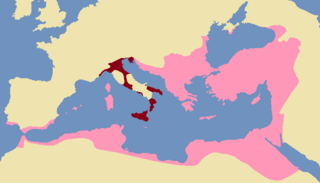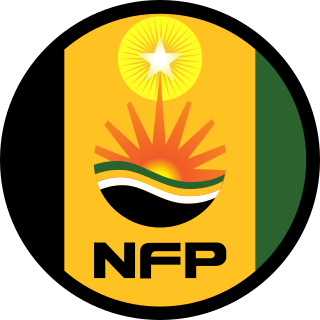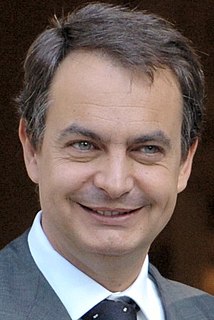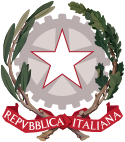
The country of Belgium is divided into three regions. Two of these regions, the Flemish Region or Flanders, and Walloon Region, or Wallonia, are each subdivided into five provinces. The third region, the Brussels-Capital Region, is not divided into provinces, as it was originally only a small part of a province itself.

Romagna is an Italian historical region that approximately corresponds to the south-eastern portion of present-day Emilia-Romagna, North Italy. Traditionally, it is limited by the Apennines to the south-west, the Adriatic to the east, and the rivers Reno and Sillaro to the north and west. The region's major cities include Cesena, Faenza, Forlì, Imola, Ravenna, Rimini and City of San Marino. The region has been recently formally expanded with the transfer of seven comuni from the Marche region, which are a small number of comuni where Romagnolo dialect is spoken.

The Exarchate of Ravenna or of Italy was a lordship of the Byzantine Empire in Italy, from 584 to 751, when the last exarch was put to death by the Lombards. It was one of two exarchates established following the western reconquests under Emperor Justinian to more effectively administrate the territories, along with the Exarchate of Africa.

Coop is a system of Italian consumers' cooperatives which operates the largest supermarket chain in Italy. Its headquarters are located in Casalecchio di Reno, Province of Bologna.

Officially local government in the Philippines, often called local government units or LGUs, are divided into three levels – provinces and independent cities; component cities and municipalities; and barangays. In one area, above provinces and independent cities, is an autonomous region, the Autonomous Region of Muslim Mindanao. Below barangays in some cities and municipalities are sitios and puroks. All of these, with the exception of sitios and puroks, elect their own executives and legislatures. Sitios and puroks are often led by elected barangay councilors.

The African Independent Congress (AIC) is a minor political party in South Africa.

Sri Lanka has held several rounds of Provincial Council elections in 2008 and 2009 to elect members to eight of the country’s Provincial Councils. The decision to hold elections in different parts of the country on separate days was a break in the usual practice, which is to hold elections for the whole country on the same day. For each provincial council, members are elected to serve a five-year term. A chief minister for the province is chosen by the elected members.

The 2011 Spanish local elections were held on Sunday, 22 May 2011, to elect all 68,230 councillors in the 8,116 municipalities of Spain and all 1,040 seats in 38 provincial deputations. The elections were held simultaneously with regional elections in thirteen autonomous communities, as well as local elections in the three foral deputations of the Basque Country and the ten island councils in the Balearic and Canary Islands.

The National Freedom Party (NFP) is a South African political party. It was launched on 25 January 2011 by Zanele kaMagwaza-Msibi, former chairperson of the Inkatha Freedom Party (IFP), along with other former IFP members.

The 2010 Italian local elections were held on different dates; most on 29–30 March oncurrently with the Regional elections.

Provincial council elections were held in Sri Lanka on 21 September 2013 to elect 148 members to three of the nine provincial councils in the country. 4.4 million Sri Lankans were eligible to vote in the election. Elections to the remaining six provincial councils were not due as they had their last election in 2009 or 2012. This was the first provincial council election in the Northern Province in 25 years.

The 1956 Italian local elections were held on 27 and 28 May. The elections were held in 7,141 municipalities and 79 provinces.

The 1960 Italian local elections were held on 6 and 7 November. The elections were held in 6,900 municipalities and 78 provinces.

The 1995 Spanish local elections were held on Sunday, 28 May 1995, to elect all 65,869 councillors in the 8,067 municipalities of Spain and all 1,034 seats in 38 provincial deputations. The elections were held simultaneously with regional elections in thirteen autonomous communities, as well as local elections in the three foral deputations of the Basque Country and the ten island councils in the Balearic and Canary Islands.

The 2003 Spanish local elections were held on Sunday, 25 May 2003, to elect all 65,510 councillors in the 8,108 municipalities of Spain and all 1,036 seats in 38 provincial deputations. The elections were held simultaneously with regional elections in thirteen autonomous communities, as well as local elections in the three foral deputations of the Basque Country and the ten island councils in the Balearic and Canary Islands.

The 1964 Italian local elections were held on 22 and 23 November. The elections were held in 6,767 municipalities and 74 provinces.

The 1970 Italian local elections were held on 7 and 8 June. The elections were held in 6,632 municipalities and 88 provinces.

Local elections in the Philippines were held on May 9, 2016. This was conducted together with the 2016 general election for national positions. All elected positions above the barangay (village) level were disputed.















